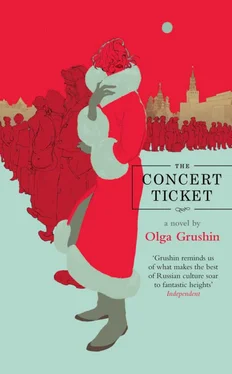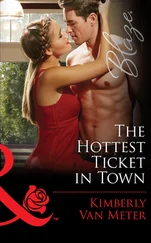Olga Grushin
THE CONCERT TICKET
IN MEMORIAM
BORIS GRUSHIN, MY FATHER
I WISH THERE HAD BEEN MORE TIME.
For we are saved by hope: but hope that is seen is not hope:
for what a man seeth, why doth he yet hope for?
But if we hope for that we see not, then do we with patience wait for it.
—ROMANS 8: 24–25
PART ONE
WINTER

1

“WHO’S LAST IN LINE? Are you last in line? What are they selling?”
“No idea, but I’m hoping for something good. Maybe some gloves, my hands are cold.”
“Imported scarves, I’ve heard.”
“Oh, are they silk? And what color? Blue would be nice. Or green.”
“You don’t want much, do you, woman? Silk scarves, indeed! It’s toothpaste, someone told me.”
“Toothpaste? Toothpaste?! You idiot, would all these people wait here for toothpaste?”
“What’s wrong with toothpaste? I could use some.”
“By the looks of your teeth, it would be the first time.”
“Oh, shut up!”
“Shut up yourself!”
“Both of you shut up, it’s not toothpaste. A man up front was saying they just received a shipment of women’s boots, genuine leather.”
“Ooh, I’d love some of those! Where is that man, I’ll ask him myself.”
“He got tired of waiting and left half an hour ago.”
“Nah, a full hour at least.”
“Two hours, more like it. I could still feel my fingers back then.”
“Well, can’t be boots, or he wouldn’t have left.”
“But what if he wasn’t married, now? What would he need with a pair of women’s boots if he wasn’t married?”
“Maybe he has a lady friend.”
“A lady friend! Do you hear that, a lady friend, and him with a mug like that—worse than that fellow over there!”
“Hey, what—did he just call me ugly?… You there, yes, you, did you just call me ugly?”
“And what if I did, what are you going to do about it?”
“I’ll show you who’s ugly, let me just get a hold of you, move there, people, move—”
“Hey, watch your elbows, there’s an old man back here, don’t push!”
“And who are you to tell me what to do?”
“No, no, I wouldn’t… Wait, I wasn’t—you misunderstood—I—”
“Good, good, knock some of his teeth out, help him save on the toothpaste!”
“Oh God, there she goes again with the toothpaste! It’s not toothpaste, it’s not toothpaste, you stupid cow, how many times must you be told, it’s not toothpaste!”
“Oh, bother, looks like no one knows what they’re selling. Could be something really good, though… Well, I have some time on my hands, might as well join in for a while. Are you last in line?”
2

ONE DAY IN NOVEMBER, returning home from work, Anna walked a different way. Her usual street was flooded with a spontaneous citizens’ parade celebrating the thirty-seventh anniversary of the Change. Ordinarily she enjoyed such diversions, but today she felt too tired to shuffle for hours in a press of other passersby, even though she knew her husband was likely to be marching, his tuba propped up on his shoulder, in the midst of the volunteer neighborhood band whose dull brass snails were even now crawling up behind her, devouring the city in an explosion of triumphant sound.
It was only three o’clock in the afternoon, but the air hung heavy with the nearing of the night, the swelling of the snow. The world smelled of heated copper and wilting carnations. In a few blocks, the streets grew deserted; everyone had left for the demonstration, and the neighborhood, on the outskirts of the city, lay bare, damp, and gray, like the bottom of some northern sea with its dregs exposed by a receding tide. Anna’s flat-heeled shoes fell to the pavements with loud thumps. Striding quickly as if trying to escape the echoes of her passage, she turned into an alley, crossed a courtyard, its sky eliminated by gloomy, drooping buildings, rounded a corner—and slowed her steps.
A small crowd of fifteen or twenty people stood lining the sidewalk before her; autumn’s last brown leaves twirled above the dark curves of their backs. Another parade preparing to set off, Anna decided after a moment, and walked faster now, clutching her bag to her chest.
As she drew even with them, an old man turned toward her.
“Join us,” he said.
She wanted to move past, then stopped, afraid that her refusal to take part in the communal merriment might appear unpatriotic—but already she noticed that the people on the sidewalk did not resemble a joyful gathering of neighbors. Hushed and oddly solitary, they waved no homemade banners, chanted no slogans; she saw an aged woman leaning on a cane, a youth with the sharpened cheekbones of someone recently ill. Uncertain, she looked back at the man who had spoken. He was dressed in a threadbare, earth-colored coat; the stealthily creeping shadows had eaten away most of his face, becoming tangled in his untidy beard, gouging deep lines in the parchment of his skin, pooling his eyes with darkness. His unblinking, sorrowful gaze unsettled Anna, and she glanced away—and it was then that she saw the kiosk.
She had been wrong, she realized, relaxing her grip on the bag. This was not a parade—merely a line. The little kiosk before her was nondescript, with no sign above it. Its single window was boarded shut, a handwritten notice tacked onto it; she was too far away to read the words. She could not recall seeing any kiosk here before, but then, it had been so long since she had last found herself deviating from her daily route—months, maybe even a couple of years, possibly longer; time had all run together for quite a while, merging into a solid, hard, flat essence, a bit like concrete, she thought unexpectedly, yes, like a vat of frozen concrete, undistinguished save for a succession of doled-out State festivities, a smattering of red and yellow candy wrappers sucked here and there into the concrete’s monolithic mass.
Not that she was complaining, of course. She had a good life, such a good life.
They all did.
“So what are they selling here?” she asked.
The old man smiled, and as his wrinkles multiplied, a deeper darkness suffused them.
“What would you like?” he said softly.
“I’m sorry?”
“They are selling,” he said, “whatever you’d most like to have. What would you like?”
She stared at him. A leaf slowly sailed through the congealed air. The people around them were quiet, their faces hazy, averted. The old man is mad, she understood with a precipitate chill, and stepped away abruptly. The sign in the window, she saw as she hastened past, announced in a scrawl: Gone to the parade . There were more words scribbled below, but she did not stop to decipher them, keeping her eyes focused on some invisible, faraway destination instead, sensing all the while the weight of the old man’s gaze upon her, sliding the length of her, from her hair, along her back, to the scuffed-up soles of her shoes.
That night, she waited for her husband to return from his march before calling the family to supper. It was, perhaps, the uncustomary lateness of the hour that made the kitchen seem somehow smaller, darker than usual; the black-and-white clock up on the wall, big, round, and bare-faced just like a clock at a train station, had presided indifferently over the departure of the last fleeting light, the arrival of the slow, ponderous shadows. From her corner at the stove, pretending to spoon a second serving into her bowl, Anna watched her mother mince a morsel of meat, watched her son listlessly construct a potato fortification all along the rim of his plate, lumpy towers rising, then mash it into dust. When, having finished their silent meal, her mother and son departed, she poured two cups of tea, added a cube of sugar to hers, and for another minute watched her husband blow at the scalding liquid, his mouth set in sullen lines, his jaws moving in some internal rhythm she could not follow.
Читать дальше














